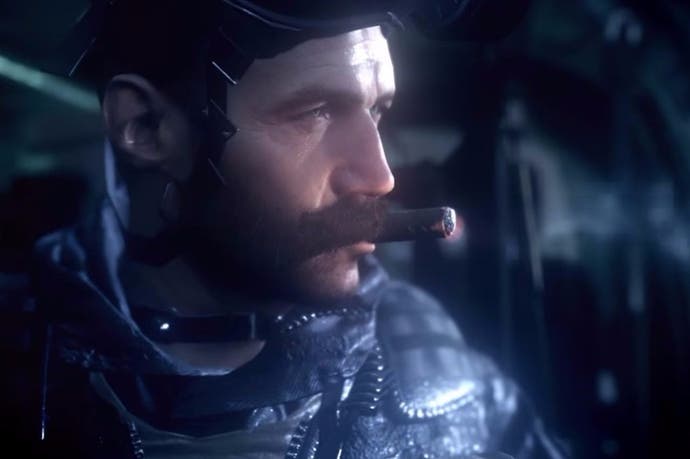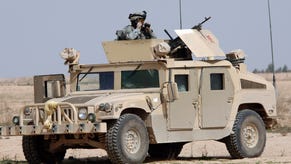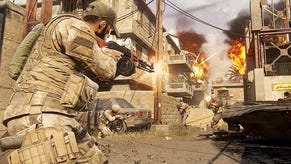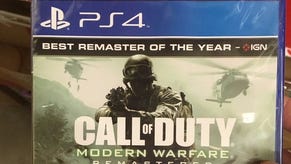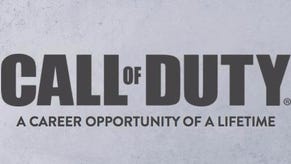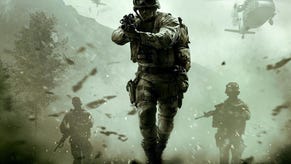Beautiful, deadly, and without feeling - why Modern Warfare Remastered is the perfect organism
Greatest regeneration.
Maybe it's something to do with Steven Spielberg. The director's Second World War drama Saving Private Ryan has become a dividing line in the history of action cinema. There is everything that came before Spielberg's Normandy beach landings, with their shellshock camerawork and stinging audio occlusion, and there is everything that came after.
To play Modern Warfare Remastered is to remember another before and to look upon our ongoing after. Returning to it feels like finding the original of a 10th-generation VHS copy - this is the template for all our wargames and shooters, and Spielberg figures in this particular watershed, too. It was his Dreamworks Interactive that created Medal Of Honor, effectively a playable Private Ryan, and it was the team invited by Spielberg to make Medal Of Honor: Allied Assault that later became Infinity Ward. Grant Collier, Vince Zampella, Jason West - names in the Modern Warfare credits that draw a direct line from one redefinition of warfare to another.
Modern Warfare is such a striking break from the past that it's easy to forget that it's also Call Of Duty 4. It feels, with the benefit of hindsight especially, much more like the beginning of something than the fourth of something. The focus on contemporary conflict represents a major shift not just in terms of setting, but of existential purpose. By moving into present day the game leaves behind the safety of the past with all its fixed meanings and solid moral foundations. World War 2 is, by overwhelming cultural if not historical consensus, a virtuous war, distant and heroic-by-default. Even Vietnam has a settled complexity - the ambivalent war, the lessons-were-learnt war. But the wars we have now, a diffuse mix of technology, intelligence and asymmetric engagements, campaigns fought against states, sects and sometimes ideas, have no such clarity.
This shift alone makes Modern Warfare revolutionary. The game plays as though nothing has changed, striding into the haze of contemporary conflict with the conviction of a Commando comic. But slipping into the role of Modern Warfare's various protagonists can feel like an unexpected compromising of the self. Shooting sleeping guards with a silenced rifle through night vision goggles feels very different to rushing German defences on D-Day - illicit and powerful in a way that explores the gap between Honor and Duty. There's a slickness to the hardware you use - red-dot sights, laser-painted airstrikes - and a sense of such overwhelming resource at your disposal that it's hard not to think of Modern Warfare, whatever else it might be, as a celebration of might. This is not a noble army retaking a continent from a dictator. It's a deadly trillion-dollar force displaying a global authority.
There is something essentially uneasy about Modern Warfare's philosophy. One of the things that does connect Modern Warfare to earlier Call Of Duty games are the quotes it flashes up during reloads. In the absence of an overbearing moral narrative these take on a new significance, capable of giving the experience an air of all-out propaganda or unexpected skepticism. Every time I read Ned Dolan's line - "Freedom is not free, but the US Marine Corps will pay most of your share" - I feel I am being forced into an indebtedness I do not care for, and when I see Bertrand Russell's glib assertion that "War does not determine who is right, only who is left" I'm always struck by what poor motivation it is for me to start killing again. The cumulative effect is rather extraordinary - a game set during a morally ambiguous conflict that isn't sure how it feels about deadly force.
There is, almost intangibly, something in the fundamentals of Modern Warfare's moving and aiming that reinforces this ambivalence. The game plays remarkably like its sequels and off-shoots still do all these years later, notwithstanding the last few iterations' wall-running and manoeuvrability. There is a lightness to it all that feels too easy, too insubstantial, as if there should be more recoil, somehow. The equal and opposite reaction of killing a man - killing lots of men - should be more powerful than this, than gliding over scenery and the tick-tick-tick of interrupting incoming fire.
If the framework of Modern Warfare's setting is cold and metallic, there is at least a human warmth somewhere at its centre. I can take or leave the game's band of US Marines, who are fine in an earnest and uninteresting way, but the presentation of its small SAS team is still exquisite almost a decade after its first appearance. What makes Captain Price and the rest so memorable, and so likeable? It's partly that they're convincingly British in a way we're still not used to seeing, dour and dry ("What the hell kind of name is Soap?") and, now I think about it, perhaps the only believable working class British people I can remember appearing in a big budget game. They seem to be torn directly from the pages of the kind of post-Gulf War SAS memoirs my dad devoured when I was at school, filled with descriptions of barked Scottish accents and unfathomable facial hair, of unglamorous hard men at the spearpoint of a vast technological army. We feel bound to them because, as their initial skepticism gives way to acceptance, their respect feels unusually earned, and unusually valuable.
This bond is built during, rather than in between missions. While its shooting might feel creaky, Modern Warfare's ability to inject meaningful moments into its action still feels remarkable. There's a sense of wonderful craft here, of minute and imaginative design, from the small bits of chatter that constantly flow during missions, to the grandstanding set pieces that define Modern Warfare. The standout moments are so numerous it's hard to really call them standout. Early on there's Crew Expendable, with its Aliens nods (suddenly the value of blue collar banter has a root) and its lilting, flooded decks. Not content with tilting the flat horizon of the first-person shooter on its axis, next the game gives us a total inversion with The Coup, a tour of a city in the grip of civil war that ends with your own execution. The Coup is a clear inspiration for the opening chaos of The Last Of Us, and only the first time that Modern Warfare forces death on the player.
Modern Warfare feels like a game that has walked all the way around the idea of death. It talks about it, it does it to you, and, of course, it makes you do it, in ways that stretch our comfort and understanding. Death From Above, another of the game's singular missions, has you providing air support to Price's team from a Lockheed AC-130, switching between hot and cold thermal imaging and big and very big cannons while reducing enemy soldiers to bits. It's detached and eerie - slaughter is almost silent from the sky - and near-photorealistic, keyed into the grammar of modern war in an almost uncanny way. It looks strikingly similar to footage of an Apache airstrike undertaken by the US military in Iraq in 2007, which was released by Wikileaks in 2010. The two even share identical clipped radio dialogue. "Light 'em up."
But Modern Warfare's extraordinary design isn't just about realism. All Ghillied Up seems for a while like it might be just an excellent AI-led co-op mission, with a young, not-yet Captain Price shadowing an older SAS soldier on a stealthy sniper outing. But beyond the thrilling escapes and unexpected humour ("Hey, Susie!") there's the poignant emptiness of Pripyat, the nuclear town abandoned in the wake of the Chernobyl disaster. As the town's skeletal Ferris wheel comes into view Infinity Ward permit themselves a moment of sentimentality, and the echoing laughter of absent children fills the toxic air. In a game so taken with the efficiency and precision of warfare this is a rare invitation to consider loss, and its structural, political, human causes.
If Modern Warfare's campaign has occasional soft spots, its multiplayer is flawlessly hard. It's very conceivable that the game's online side has, in the end, been even more influential than its story, ushering in an age of XP and unlockable rewards, a ruthless commodification of war. Modern Warfare arrived two weeks before Halo 3, a shooter with no perks, loadouts or sprinting, and would eventually sweep Bungie's game, along with its more considered approach to multiplayer, clean away. The speed and compulsion of Modern Warfare - that metallic efficiency, rendered in a breadcrumb trail of deadly hardware and levelling - eventually proved irresistible even to Halo's creators, who altered the design of Xbox's flagship series to accommodate it.
When shifted into this context the lightness of Modern Warfare's handling becomes thrillingly, infuriatingly uncompromising. Where the campaign has you cowering behind cover, red-screened and waiting to regain health, online you are already dead. Gunfights are split-second contests, when they are contests, instead of unsighted executions. There's a sense of constant, mortal vulnerability, interrupted by occasional flights of manic domination, like sprinting along a knife edge of anxiety and adrenaline.
When Modern Warfare was first released the accumulated result of all this was a philosophy of play that I struggled to appreciate. The game is reliant on the brute force advantage of hours played, and its killstreaks reward the strong with further strength. Now, though, this approach seems completely logical, if not entirely reasonable. Of course this is the philosophy of Modern Warfare, a game searching for a moral purpose with a deep reverence of authority. A game about waging war on terror, that confronts the impossibility of anything as easy as winning, and a game that nevertheless loves a winner.
